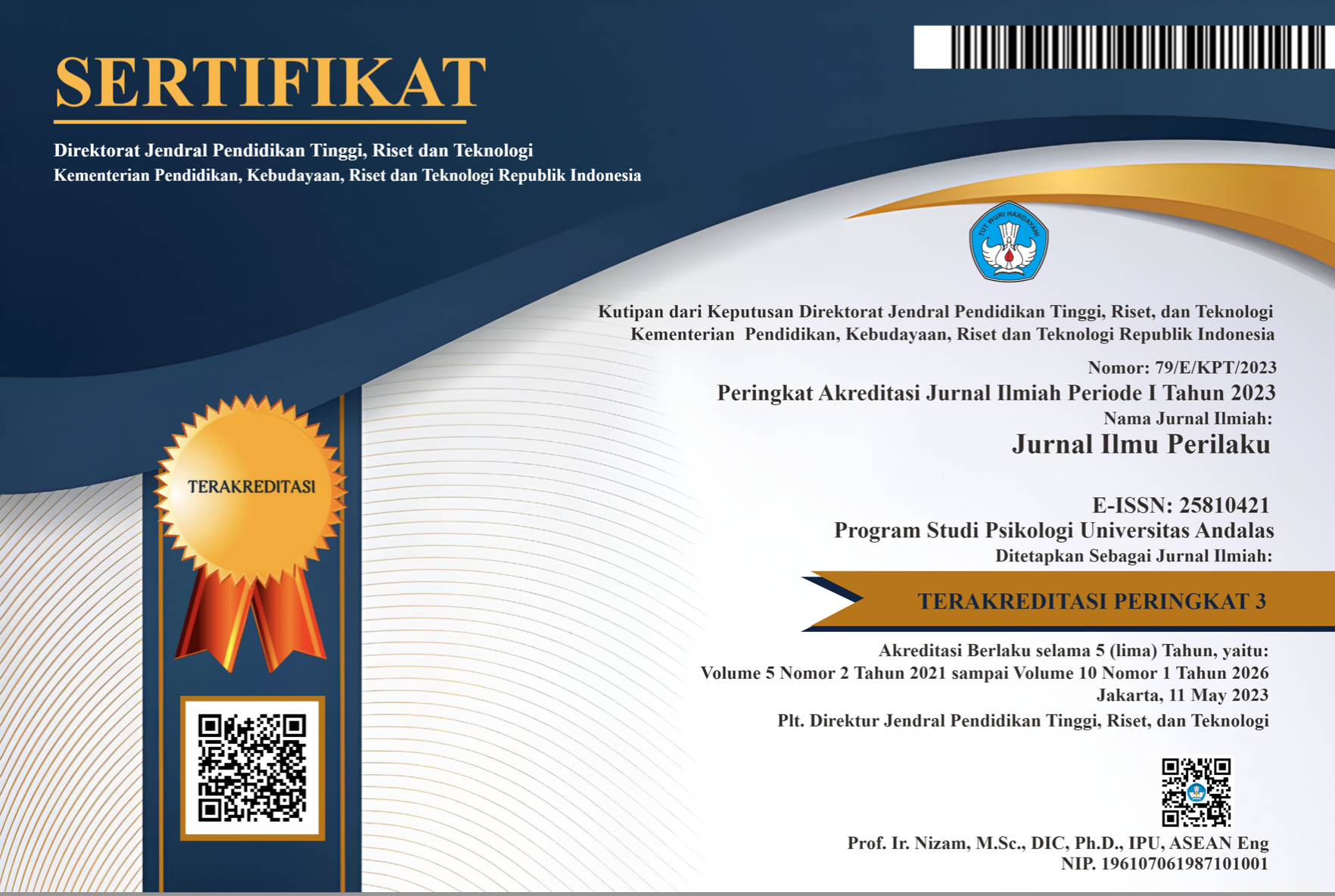Uji Model Kepatuhan Protokol Covid-19 pada Masyarakat Madura Perantauan
Abstract
As Covid-19 cases soared in Indonesia, various efforts have been made by the government to overcome the spike in cases. This study aimed to examine the model of compliance with the Covid-19 protocol for migrant Madurese through perceived risk of Covid-19, citizen trust, locus of control, and anti-vaccine attitudes. A total of 245 migrant Madurese community were recruited by purposive sampling. The results showed that the theoretical model of compliance with the Covid-19 protocol was built through Citizen Trust, Locus of Control, and Anti-Vaccine Attitudes, while risk perception as a moderating variable had no effect on the compliance with the Covid-19 protocol. The results also showed that risk perception did not have a significant effect on the compliance with the Covid-19 protocol, but risk perception was influenced by citizen trust and anti-vaccine attitudes. Citizen compliance and anti-vaccine attitudes only had a direct effect on compliance with the Covid-19 protocol without any mediating variables.
Downloads
References
Aldo, M. (2019, June 9). Sejarah Merantau Orang Madura. Liputan 6. https://www.liputan6.com/regional/read/3985443/sejarah-merantau-orang-madura
Banai, P I., Banai, B., & Mikloušić, I. (2020). Beliefs in COVID-19 conspiracy theories predict lower level of compliance with the preventive measures both directly and indirectly by lowering trust in government medical officials. 1-28. https://doi.org/10.31234/osf.io/yevq7
Baumgaertner B., Carlisle J.E., & Justwan. F (2018) The influence of political ideology and trust on willingness to vaccinate. PLOS ONE 13(1).1-13. https://doi.org/10.1371/journal.pone.0191728
Bavel, J. V., Baicker, K., & Willer, R. (2020). Using social and behavioral science to support covid-19 pandemic response. Nature Human Behavior, 460-471. https://doi.org/10.1038/s41562-020-0884-z
Beaton, D.E., Bombardier, C., Guillemin, F., & Ferraz, M. B.(2000). Guidelines for the Process of Cross-Cultural Adaptation of Self-Report Measures. SPINE, 25(24), 3186–3191.
Ceda, A & García, Ly. (2021). Willingness to Pay for a COVID-19 Vaccine. Applied Health Economics and Health Policy. 1-9. https://doi.org/10.1007/s40258-021-00644-6
Clark, Cory & Davila, Andres & Regis, Maxime & Kraus, Sascha. (2020). Predictors of COVID-19 Voluntary Compliance Behaviors: An International Investigation. Global Transitions. 2, 76-82. https://doi.org/10.1016/j.glt.2020.06.003
Darmawan, D. (2014). Metode Penelitian Kuantitatif. Bandung: PT. Remaja Rosdakarya.
Devereux, Paul & Miller, Monica & Kirshenbaum, Jacqueline. (2021). Moral disengagement, locus of control, and belief in a just world: Individual differences relate to adherence to COVID-19 guidelines. Personality and Individual Differences. 182, 1-7. https://doi.org/10.1016/j.paid.2021.111069.
Devine, D., Gaskell, J., Jennings, W., & Stoker, G. (2021). Trust and the Coronavirus Pandemic: What are the Consequences of and for Trust? An Early Review of the Literature. Political Studies Review., 19(2), 274-283.
Dryhurst, S., Schneider, C., Kerr, J., & Freeman, A. (2020). Risk perception of covid-19 around the world. Journal of Risk Research. 23(7-8), 994-1006. https://doi.org/10.1080/13669877.2020.1758193
Ferdinand, A. (2000). Manajemen Pemasaran: Sebuah Pendekatan Stratejik. Research Paper Series. 1. 1-55.
Goldstein, D. A., & Wiedemann, J. (2021, April 16). Who do you trust? The consequences of political and social trust for public responsiveness to COVID-19 orders. Perspectives on Politics, hal. 1-27.
Grimmelikhuijsen, S., & Knies, E. (2015). Validating a scale for citizen trust. International Review of Administrative Sciences 83(3), 583–601..https://doi.org/10.1177/0020852315585950
Hassan, M. S., Halbusi, H. A., Najem, A., Razali, A., Williams, K. A., & Mustamil, N. M. (2021). Impact of Risk Perception on Trust in Government and Self-Efficiency During COVID-19 pandemic: Does Social Media Content Help Users Adopt Preventative Measures? Research Square, 1-34. https://doi.org/10.1007/s12144-022-02947-w.
Hornsey, M. J., Harris, E. A., & Fielding, K. S. (2018). The psychological roots of anti-vaccination attitudes:A24-nation investigation. Health Psychology, 37(4), 307–315. https://doi.org/10.1037/hea0000586
Justwan F, Baumgaertner B, Carlisle JE, Carson E, Kizer J (2019) The effect of trust and proximity on vaccine propensity. PLOS ONE 14(8), 1-16 https://doi.org/10.1371/journal.pone.0220658
Kumar, R. (2011). RESEARCH METHODOLOGY a step-by-step guide for beginners (3rd ed.). London: Sage.
Kwok, Kin On; LIi, Kin Kit; Wei, Wan In; Tang, Arthur; Wong, Samuel Yeung Shan; Lee, Shui Shan (2021). Influenza vaccine uptake, COVID-19 vaccination intention and vaccine hesitancy among nurses: a survey. International Journal of Nursing Studies, 114(), 1-29. https://doi.org/10.1016/j.ijnurstu.2020.103854
Latkin, C. A., Dayton, L.,& Yi, G. (2021). Mask usage, social distancing, racial, and gender correlates of COVID-19 vaccine intentions among adults in the US. PLOS ONE, 1-11. https://doi.org/10.1371/journal.pone.0246970
Lazarus J. V., Ratzan, S.C., Palayew, A., Gostin. L. O., Larson, H. J., Rabin, K., Kimball, S., & Mohandes, A. E. (2021). A global survey of potential acceptance of a COVID-19 vaccine. Nature Medicine, 27. 225-228. https://doi.org/10.1038/s41591-020-1124-9
Lee C, Whetten K, Omer S, Pan W, Salmon D. (2016). Hurdles to herd immu-nity: Distrust of government and vaccine refusal in the US, 2002–2003.Vaccine, 34(34). 3972-3978. https://doi.org/10.1016/j.vaccine.2016.06.048
Lo Presti, Sara & Mattavelli, Giulia & Canessa, Nicola & Gianelli, Claudia. (2022). Risk perception and behaviour during the COVID-19 pandemic: Predicting variables of compliance with lockdown measures. PLOS ONE. 17(1),1-18. https://doi.org/10.1371/journal.pone.0262319
Mækelæ, M. J., Reggev, N., Dutra, N. B., Tamayo, R. M., Silva-Sobrinho, R. A., Klevjer, K., & Pfuhl, G. (2020). Perceived efficacy of COVID-19 restrictions, reactions and their impact on mental health during the early phase of the outbreak in six countries. Royal Society, 7(8), https://doi.org/10.1098/rsos.200644
Martin, L., & Petrie, K. (2017). Understanding the Dimensions of Anti-Vaccination Attitudes: the Vaccination Attitudes Examination (VAX) Scale. Annals of Behavioral Medicine, 51(5), 652-660. https://doi.org/10.1007/s12160-017-9888-y
Mowen, J. C., & Minor, M. (2002). Perilaku Konsumen. Jakarta: Erlangga.
Narimawati, U., Sarwono, J., Munawar, D., Winanti, M. B., (2020). Metode Penelitian dalam Implementasi ragam Analisis. Yogyakarta: Andi
Octaviani, A., & Akhrani, L. A. (2020). COVID-19 : Assessing the Role of Citizen Trust to. Yogyakarta: International Conference Labma Scientific Fair.
Plohl, N., & Musil, B. (2021). Modeling compliance with COVID-19 prevention guidelines: the critical role of trust in science. PSYCHOLOGY, HEALTH & MEDICINE, 26(1), 1-12. https://doi.org/10.1080/13548506.2020.1772988
Pranita, E. (2021, June 8). 3 Penyebab Lonjakan Kasus Covid-19 di Bangkalan Madura, Apa Saja? Kompas.com. https://www.kompas.com/sains/read/2021/06/08/083100423/3-penyebab-lonjakan-kasus-covid-19-di-bangkalan-madura-apa-saja?page=all
Quintal, V. A., Lee, J. A., & Soutar, G. N. (2010). Risk, uncertainty and the theory of planned behavior: A tourism example. Tourism Management, 31(6), 797-805. https://doi.org/10.1016/j.tourman.2009.08.006
Rapisarda, A., Loannoni, E., Izzo, A., D’Ercole, M., & Montano,. N. (2021). Is There a Place for Spinal Cord Stimulation in the Management of Patients with Multiple Sclerosis? A Systematic Review of the Literature. Hindawi, 1-4. https://doi.org/10.1155/2021/9969010
Sarwono, J. (2010). Pengertian Dasar Structural Equation Modeling (SEM). International Women Univeristy Bandung
Syamsuddin, M. (2018). Orang Madura Perantauan di Daerah Istimewa Yogyakarta. APLIKASIA: Jurnal Aplikasi Ilmu-ilmu Agama. 18 (1). 1-22.
Szczerbińska, K., Brzyski, P., Prokop-Dorner, A., Ocetkiewicz, T., & Barańska, I. (2017). Development and validation of Attitudes Towards Vaccinations Scale (ATVS) – part 1. European Geriatric Medicine, 8(4), 320–324. https://doi.org/10.1016/j.eurger.2017.06.006
Setyaningsih. (2021). Pengaruh situasi sosial dan nilai budaya madura terhadap regulasi emosi individunya. Personifikasi Ilmu Psikologi, 12 (1), 22-38. https://doi.org/10.21107/personifikasi.v12i1.10110
Sholik, M. I., Rosyid, F., Mufa’idah, K., Agustina, T., & Ashari, U. R. (2016). Migration as culture (social system exploration of bawean community). Cakrawala, 10(2), 143–153. https://doi.org/10.32781/CAKRAWALA.V10I2.39G37
Sobków, Agata & Zaleskiewicz, Tomasz & Petrova, Dafina & Garcia-Retamero, Rocio & Traczyk, Jakub. (2020). Worry, Risk Perception, and Controllability Predict Intentions Toward COVID-19 Preventive Behaviors. Frontiers in Psychology. 11. 1-15. https://doi.org/10.3389/fpsyg.2020.582720
Sugiyono. (2013). Metode penelitian kuantitatif, kualitatif dan R&D (26 ed.). Bandung: Alfabeta.
Talib, S. R., Kawengian, D. D., & Pasoreh, Y. (2021). Kajian peran humas dalam meningkatkan kepercayaan masyarakat terhadap vaksin sinovac. Ejournal Unsrat, 3(4), 1-6.
Utama, F., & Setiawan, D. (2020). Persepsi risiko covid-19 terhadap intensi berwisata di jabodetabek. Jurnal Bisnis dan Manajemen, 7(2), 185-196.
Vaughan, E., & Tinker, T. (2011). Effective Health Risk Communication About Pandemic Influenza for Vulnerable Populations. American Journal of Public Health, 99, 324-334. https://doi.org/10.2105/AJPH.2009.162537
Vinck, P. P. (2019). Institutional trust and misinformation in the response to the 2018-19 Ebola outbreak in North Kivu, DR Congo: a population-based survey. The Lancet. Infectious diseas, 529-536.
Viswanath, N. (2021). Analysis of the Second COVID-19 Wave in India Using a Birth-Death Model. Government Engineering College.1-8. https://doi.org/10.1101/2021.05.19.21257447
Wong, C. M., & Jensen, O. (2020). The paradox of trust: perceived risk and public compliance during the COVID-19 pandemic in Singapore. Journal of Risk Research, 23(7-8), 1021–1030. https://doi.org/10.1080/13669877.2020.1756386
Ye, M., & Lyu, Z. (2020). Trust, risk perception, and COVID-19 infections: Evidence from multilevel analyses of combined original dataset in China. Social Science & Medicine, 265, 1-11. http://dx.doi.org/10.1016/j.socscimed.2020.113517
Yıldırım, M., Geçer, E., & Akgül, Ö. (2020). The Impacts of Vulnerability, Perceived Risk, and Fear on Preventive Behaviours Against COVID-19. Psychology, Health & Medicine. 1-9. https://doi.org/10.1080/13548506.2020.1776891.
The non-commercial use of the article is governed by the Creative Commons Attribution license as currently displayed on Creative Commons Attribution-NonCommercial-ShareAlike 4.0 International License.
JIP's spirit is to disseminate articles published are as free as possible. Under the Creative Commons license, JIP permits users to copy, distribute, display, and perform the work for non-commercial purposes only. Users will also need to attribute authors and JIP on distributing works in the journal.
Please find the rights and licenses in Jurnal Ilmu Perilaku (JIP).
- License
The non-commercial use of the article will be governed by the Creative Commons Attribution license as currently displayed on Creative Commons Attribution-NonCommercial-ShareAlike 4.0 International License.
- Author’s Warranties
The author warrants that the article is original, written by stated author(s), has not been published before, contains no unlawful statements, does not infringe the rights of others, is subject to copyright that is vested exclusively in the author and free of any third party rights, and that any necessary written permissions to quote from other sources have been obtained by the author(s).
- User Rights
JIP's spirit is to disseminate articles published are as free as possible. Under the Creative Commons license, JIP permits users to copy, distribute, display, and perform the work for non-commercial purposes only. Users will also need to attribute authors and JIP on distributing works in the journal.
- Rights of Authors
Authors retain the following rights:
- Copyright, and other proprietary rights relating to the article, such as patent rights,
- The right to use the substance of the article in future own works, including lectures and books,
- The right to reproduce the article for own purposes, provided the copies are not offered for sale,
- The right to self-archive the article.
- Co-Authorship
If the article was jointly prepared by other authors, the signatory of this form warrants that he/she has been authorized by all co-authors to sign this agreement on their behalf, and agrees to inform his/her co-authors of the terms of this agreement.
- Termination
This agreement can be terminated by the author or JIP upon two months’ notice where the other party has materially breached this agreement and failed to remedy such breach within a month of being given the terminating party’s notice requesting such breach to be remedied. No breach or violation of this agreement will cause this agreement or any license granted in it to terminate automatically or affect the definition of JIP.
- Royalties
This agreement entitles the author to no royalties or other fees. To such extent as legally permissible, the author waives his or her right to collect royalties relative to the article in respect of any use of the article by JIP or its sublicensee.
- Miscellaneous
JIP will publish the article (or have it published) in the journal if the article’s editorial process is successfully completed and JIP or its sublicensee has become obligated to have the article published. JIP may conform the article to a style of punctuation, spelling, capitalization, referencing and usage that it deems appropriate. The author acknowledges that the article may be published so that it will be publicly accessible and such access will be free of charge for the readers.










